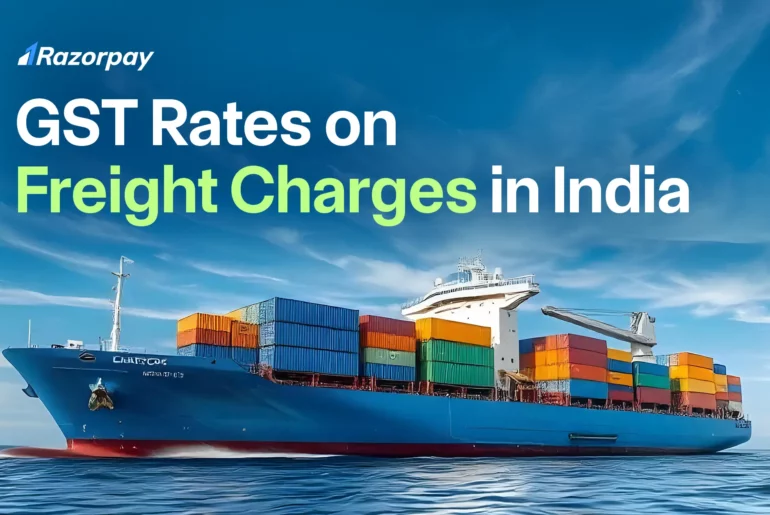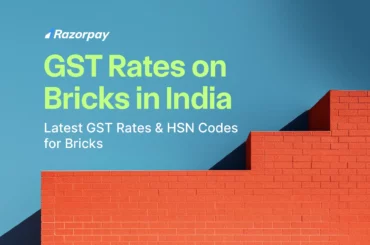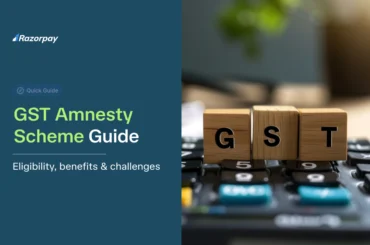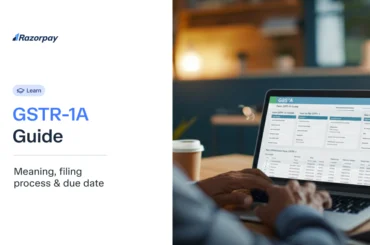Freight charges refer to the overall cost of moving goods across various modes—such as air, sea, or road. It’s important to note that while Goods Transport Agencies (GTA) specifically handle road transport and have distinct GST rules, the term freight charges covers a broader range of transportation services. Understanding GST on freight charges is crucial for businesses involved in goods transportation.
Read More: GST Rates in India – 2026
Table of Contents
GST on Freight Charges
The following are the freight services covered under GST include:
- Road transport (Goods Transport Agency)
- Rail transport
- Air transport (domestic and international)
- Ocean or sea transport (domestic and international)
1. GST on Freight Charges Applicable to Road Transport
Freight charges for road transport fall under the Goods Transport Agency (GTA) category. If the service provider opts for the forward charge mechanism, where the supplier is responsible for paying the tax, the applicable GST rate is 5%. However, under the Reverse Charge Mechanism (RCM), where the recipient of goods is liable to pay the tax, the GST rate increases to 12%.
2. GST on Freight Charges Applicable to Rail Transport
For freight services via rail, the applicable GST rate is 5%. Rail transport remains a preferred mode for heavy and bulk goods transportation, often used for long-distance shipments.
3. GST on Freight Charges Applicable to Air Freight
Air freight services are typically subject to 18% GST, both for domestic and international air cargo transportation.
4. GST on Freight Charges Applicable to Ocean Freight
Ocean freight or sea transport is subject to a GST rate of 5% under reverse charge mechanism for transportation of goods via vessels for both import and export.
Related Read: GST on Transport Services in 2025
Who Pays GST on Freight Charges?
The party liable to pay GST on freight charges depends on the nature of the contract and the GST framework in place.
Below is a table showing who is responsible for paying GST in different scenarios:
Mode of Transport |
GST Payer |
| Goods Transported by road (normal conditions) | Service provider (transport company) |
| Goods transported by road (RCM applies) | Recipient of goods (registered business) |
| Goods transported by rail | Service provider (railway company) |
| Goods transported by air | Service provider (airlines) |
| Goods transported by sea | Service provider (shipping company) |
| Composite supply involving freight | GST paid by the supplier of the composite service (Ex: E-commerce company) |
HSN Code for Freight Charges
Correctly applying HSN (Harmonized System of Nomenclature) codes for freight services is vital for accurate invoicing and GST compliance.
HSN codes for different modes of freight transport:
Description of Services |
HSN Code |
|
Goods Transport Services |
9965 |
|
Road Transport Services of Goods Including Letters, Parcels, Live Animals, Household & Office Furniture, Containers Etc. By Refrigerator Vehicles, Trucks, Trailers, Man Or Animal Drawn Vehicles Or Any Other Vehicles. |
996511 |
|
Railway Transport Services of Goods Including Letters, Parcels, Live Animals, Household & Office Furniture, Intermodal Containers, Bulk Cargo Etc. |
996512 |
|
Transport Services of Petroleum & Natural Gas, Water, Sewerage and Other Goods Via Pipeline |
996513 |
|
Other Land Transport Services of Goods N.E.C. |
996519 |
|
Coastal And Transoceanic (Overseas) Water Transport Services of Goods by Refrigerator Vessels, Tankers, Bulk Cargo Vessels, Container Ships Etc. |
996521 |
|
Inland Water Transport Services of Goods by Refrigerator Vessels, Tankers, and Other Vessels. |
996522 |
|
Air Transport Services of Letters & Parcels and Other Goods |
996531 |
|
Space Transport Services of Freight |
996532 |
Reverse Charge Mechanism (RCM) on Freight
Under the Reverse Charge Mechanism (RCM), GST rate applicable is 12% for GTA services and the liability to pay GST shifts from the supplier to the recipient of the goods transported. RCM is particularly relevant in the context of road transport provided by Goods Transport Agencies (GTA).
Example of Reverse Charge Mechanism
If a business hires a GTA for transporting goods, under RCM, the recipient of goods must pay the applicable GST directly to the government, instead of the GTA.
Related Read: GST on Flight Tickets: Latest Rates & Impact
Frequently Asked Questions
1. Is there ITC for Freight Charges?
Yes, Input Tax Credit (ITC) can be claimed on freight charges, provided the recipient is registered under GST and the GST has been duly paid.
2. Are there any exemptions for GST on Freight Charges?
Yes, certain services like freight transportation of agricultural produce, newspapers, and relief materials are exempt from GST.
3. Are all freight services subject to Reverse Charge Mechanism (RCM)?
No, only road transport services provided by a Goods Transport Agency (GTA) are subject to RCM. Other modes like rail, air, and ocean transport generally follow the forward charge mechanism.
4. What is the difference between a Goods Transport Agency (GTA) and freight services under GST?
A GTA is a specific term used for road transport agencies involved in transporting goods by road. Other freight services (rail, air, sea) are taxed separately and may not fall under the GTA category.
5. Who pays freight charges?
Freight charges are typically paid by the consignee (recipient of goods), but in some cases, the supplier or a third-party logistics provider may bear these costs depending on the agreement between parties.




